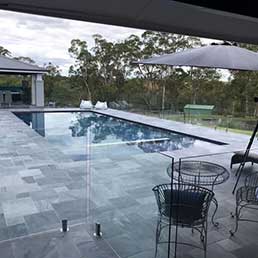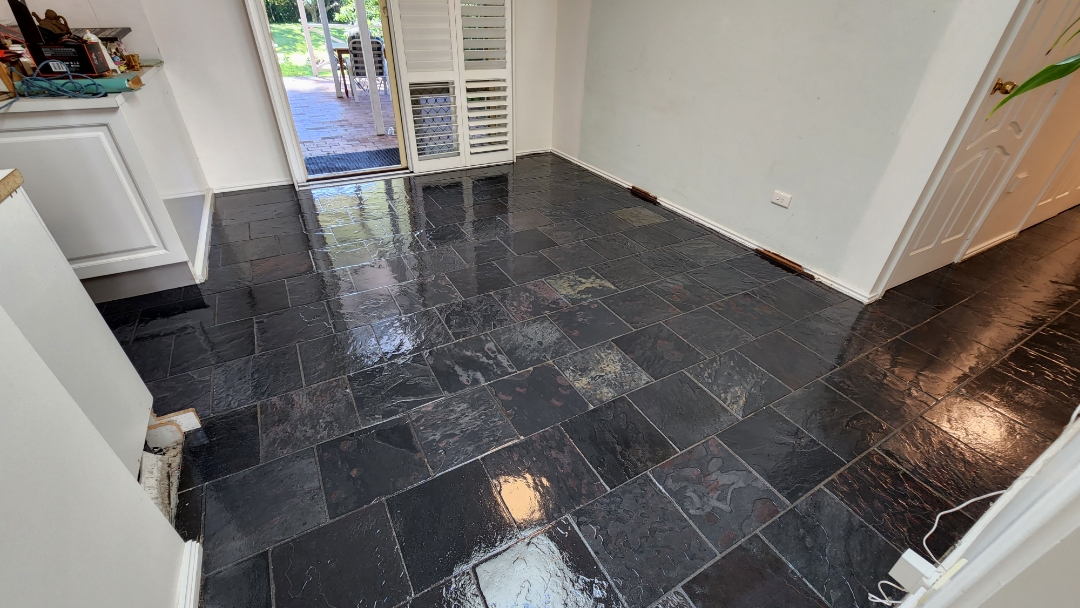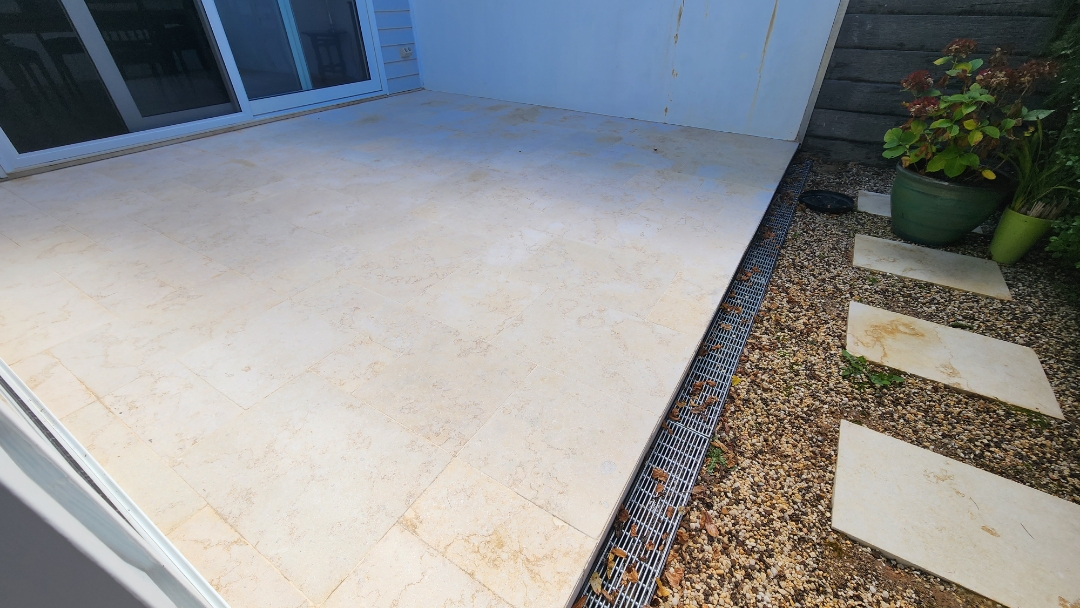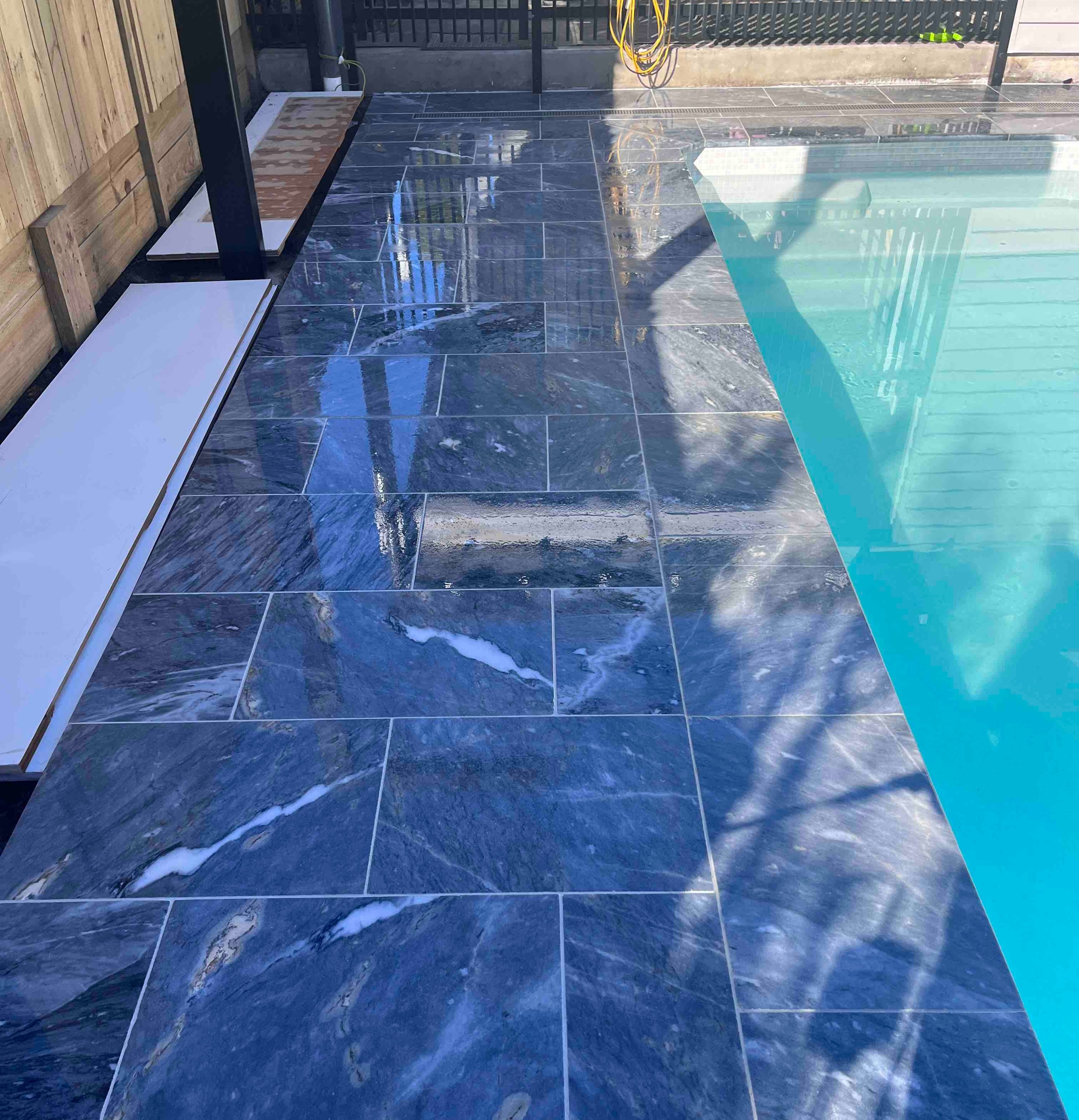With so many sealers on the market today, it can be confusing to determine which sealer is the right choice for your marble. Which one will work, which one won't, which sealer suits your situation, and how do they differ?
Sealing and Protecting Marble
Sealing prevents stain-carrying moisture from being absorbed by your marble.All natural stone wall and floor tiles are absorbent to some degree. By pouring a teaspoon of water on an unsealed marble tile, you can see how quickly it absorbs, indicating how a potential stain can also be absorbed. This is because marble tiles are porous, with small pinholes and open fissures as part of their natural texture.
When used to cover flooring and walls, marble tiles require careful preparation, sealing, and ongoing maintenance to preserve their beauty and durability.
Unsealed marble soaks up moisture quickly.
Marble is a porous material, meaning that without a sealer, dirt and stains can become easily trapped in the stone's pores, as well as the grout. Regular sealing helps prevent this and maintains the stone's appearance.
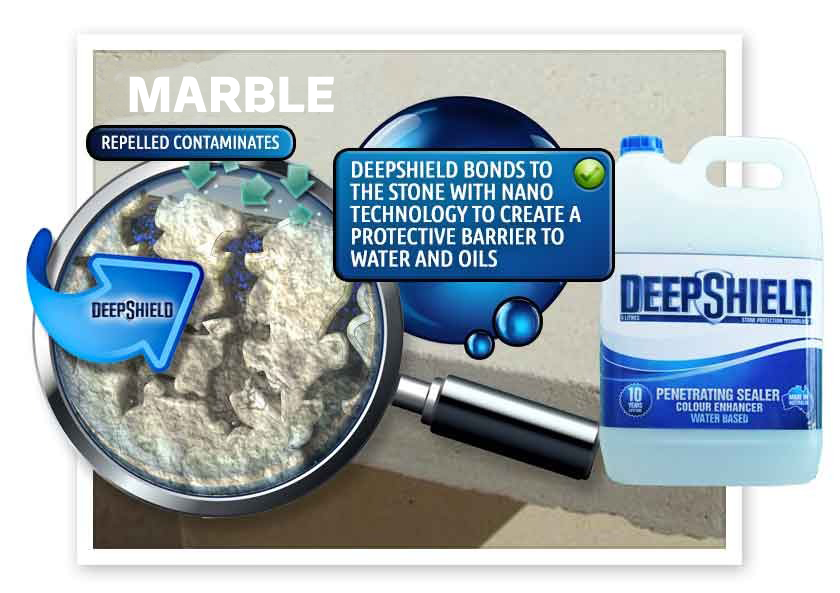 Marble benefits from being sealed in a number of ways:
Marble benefits from being sealed in a number of ways:
- Stain prevention
- Prevention of discoloration
- Marble protection
- Surface enhancement
- Easier regular maintenance
When marble is sealed, cleaning is simple – frequent sweeping and an occasional wash with a soft cloth and soap and water can help keep your marble in excellent condition for years to come. Sealing marble with a quality stone sealant like Penetrating Sealer can increase the longevity of your stone and block out harmful moisture, mold, and calcification.
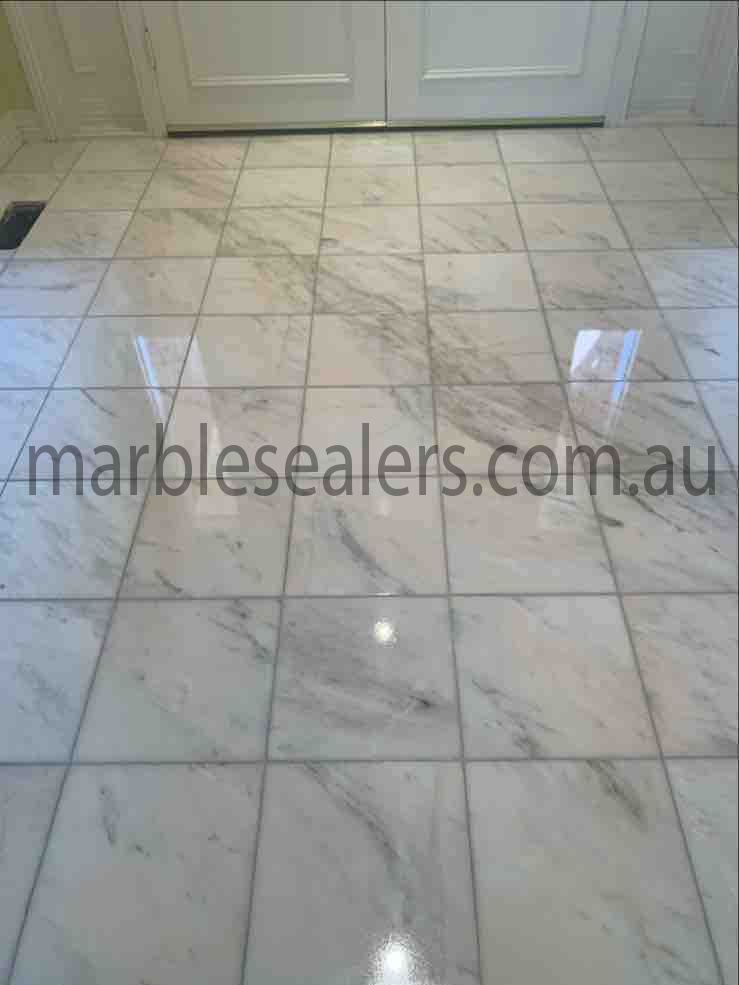
Once sealed, cleaning Marble is a breeze!
Choosing the Best Sealer
Impregnating sealers designed for marble stone are typically suspended in a liquid carrier, which can be either water or solvent-based. These sealers are formulated to penetrate the small pinholes and open fissures just below the surface of the marble. Once absorbed, the carrier evaporates, leaving the sealer behind. This sealer then chemically reacts with the surface pores of the marble, forming a breathable protective barrier. This barrier helps to prevent staining and moisture penetration while still allowing the marble to breathe naturally.
An impregnating sealer safeguards your marble surface and grout from absorbing stains, making cleaning and maintenance significantly easier. Certain sealers offer lasting protection for a few years, while Australia's line of impregnating water based sealers can extend that protection for up to 15 years, ensuring your marble retains its natural beauty for longer periods.
For marble stone, solvent-based sealers are typically reserved for extreme cases and are generally not recommended. Water-based sealers, on the other hand, utilize advanced technologies such as nanotechnology and fluoro-polymer technology, making most older solvent-based products obsolete.
These modern Water-based sealers provide superior protection while preserving the natural beauty of marble.
Solvent-based products for marble stone often contain toxic fumes that can be hazardous to health, necessitating the area to be vacated for up to 48 hours after application. Additionally, solvents can cause damage to property, including skirting boards, doors, paint, and adjacent areas. For these reasons, solvent-based sealers are generally not recommended for marble stone.
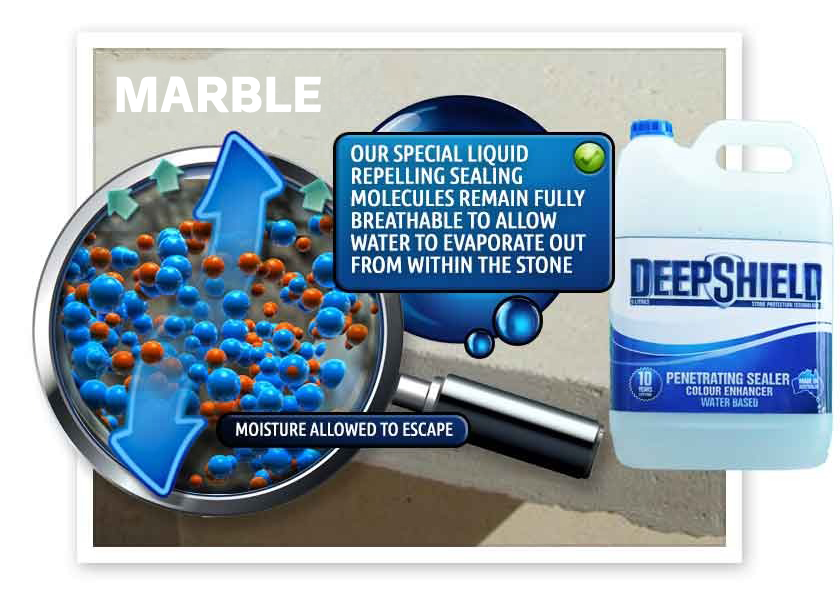
- To provide the best possible protection from oil and water-based stains, maintain the appearance and slip resistance of your marble, and prevent damaging moisture from being trapped within the stone, it is recommended to seal your marble with a high-quality, invisible, fully breathable impregnating sealer.
Generally impregnating sealers for marble stone are effective for both interior and exterior use, including wet areas such as kitchens, bathrooms, laundries, patios, and around swimming pools.
Impregnating Sealer properties for Marble Stone
- Deep Penetration: Penetrates into the marble substrate and attaches its protection to the walls within the micro-pore structure, allowing for total vapor transmission through the stone.
- Color and Sheen: Does not change the color or sheen of the marble.
- Durability: Does not need to be reapplied after each cleaning.
- Surface Protection: Because the sealer does not remain on the surface, it will not scratch or scuff. Without a surface coating to wear off, the sealer requires less frequent re-application compared to topical sealers.
- A penetrating colour enhancing sealer is designed to enhance and enrich the natural look of marble surfaces.
- This sealer is ideal for marble for two main reasons. Firstly, as an impregnating sealer, it penetrates deep into the pores of the marble, providing long-lasting and robust protection against ingrained dirt. Secondly, it contains color-intensifying properties that enhance the natural colors in the marble, bringing out its inherent beauty and vibrancy.
- Longevity: Protection is contained within the substrate, not just on the surface.
- UV Resistance: Not affected by UV light, making it great for both outdoor and indoor use.
- Breathability: Allows the stone to 'breathe,' enabling retained moisture to escape.
- Safety: The surface does not become slippery.
- Durability: Improves
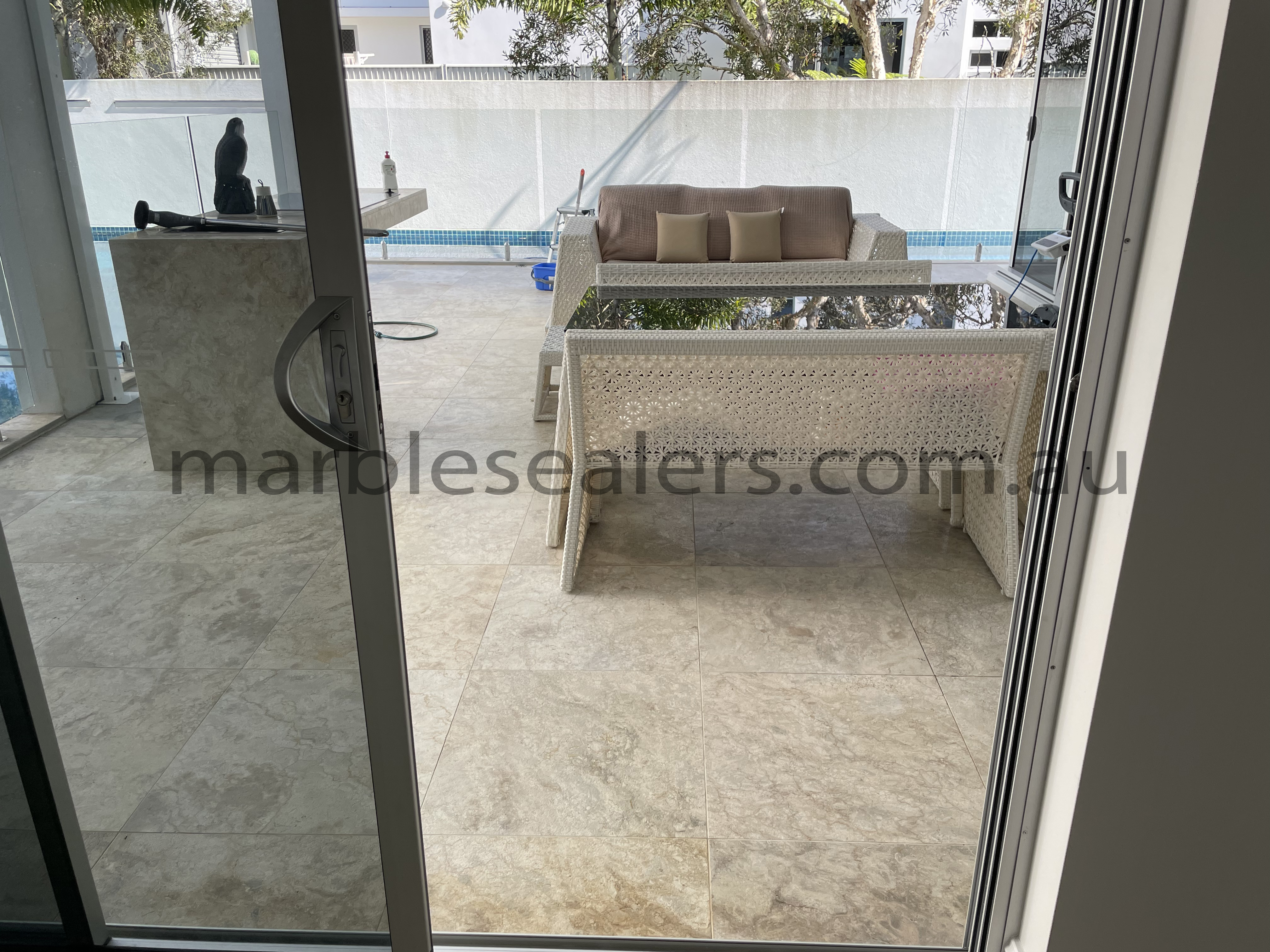 Sealing using a long-lasting penetrating sealer will not only help to prevent staining but also extend the life of your marble and make regular maintenance much easier.
Sealing using a long-lasting penetrating sealer will not only help to prevent staining but also extend the life of your marble and make regular maintenance much easier.
Impregnating penetrating sealants penetrate into the marble substrate itself, soaking into the microscopic pinholes and open fissures that make up its natural texture.
A clear impregnating sealer won't change the look or feel of your sealed marble, won't affect the stone's ability to release vapor, and will last much longer than film-forming sealers. Here are the benefits of using a clear impregnating sealer for marble:
-
Unsealed marble surfaces are highly porous and susceptible to permanent staining from everyday spills. Sealing is important if you want to protect your marble against unwanted staining and deterioration.
If you have a marble tiled floor, you will know that it absorbs liquids quickly, making it vulnerable to potential stains.
Topical sealers
Topical sealers for marble stone are applied to create a protective glossy finish on the surface, enhancing its natural beauty while safeguarding it from stains and damage. On the other hand, penetrating sealers are designed to permeate the surface of the marble, shielding each pore within its structure from potential harm. This dual approach ensures comprehensive protection for your marble, preserving its elegance and integrity for years to come.
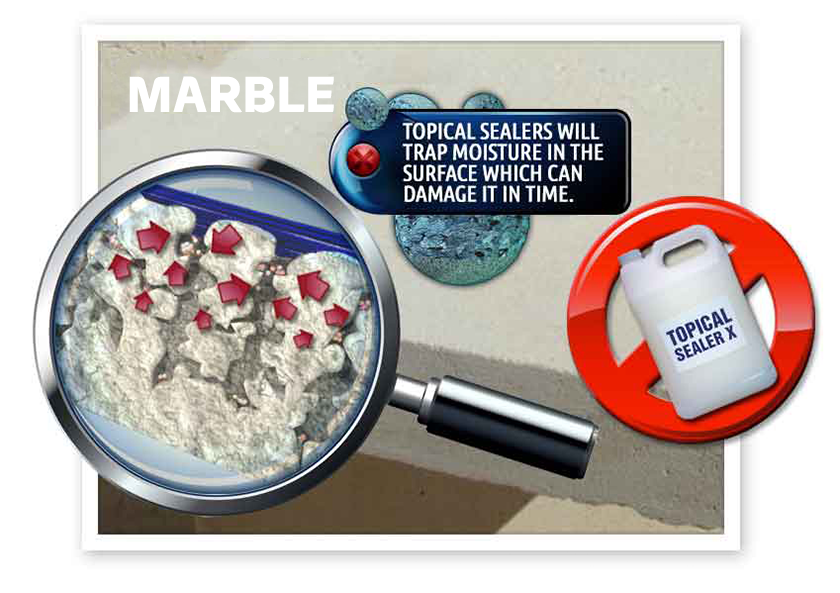
When it comes to topical sealers for marble stone, there are some drawbacks to consider:
- Frequent Reapplication: Topical sealers often necessitate regular reapplication to maintain their effectiveness, which can become a time-consuming task.
- Complete Removal Required: Before reapplication, the existing sealer must be entirely removed, adding extra effort and potential costs to the maintenance process.
- Limited Breathability: Marble needs to breathe to regulate moisture content effectively. Topical sealers can inhibit this natural process, trapping moisture within the stone and potentially leading to issues like efflorescence or discoloration over time.
- Susceptible to Damage: The glossy film created by topical sealers is prone to scratching and scuffing, diminishing the aesthetic appeal of the marble surface.
- Increased Slipperiness: The shiny surface resulting from topical sealers can pose a slip hazard, especially when the marble is wet, requiring additional precautions for safety.
- Color Alteration: Some topical sealers may alter the color of the marble, affecting its natural appearance and potentially clashing with the intended design aesthetic.
Red wine, oil, and grease, especially, can cause damage to marble that may require heavy resurfacing machinery to fully remove. While sealing marble won't completely prevent liquids from penetrating it, it will provide you with a window of time to clean spills before permanent staining sets in.
Cleaning and maintaining marble flooring can become challenging if left unsealed, as surface contaminants will readily penetrate the porous structure of marble, making them tough to remove.
It is highly recommended to apply a deep-penetrating impregnating sealer to marble floors, as it offers long-lasting protection and resistance against stains.
The finest penetrating sealer currently on the market is Australian-made. They produce non-solvent sealers that are effortlessly applied using a brush, roller, or sprayer, and they dry within a few hours. These deep-penetrating marble sealers are offered in a dry, invisible finish or with a slightly wet, color-enhancing effect, providing protection for up to 10 to 15 years.
Pre-Sealing Preparation
- Pre-sealing preparation is crucial for marble surfaces. Ensure the surface is clean and looks exactly as desired before sealing, as it may become challenging to remove stains once the sealer has been applied. Avoid using acidic cleaners on marble, as they can cause damage.
- Marble should not have any other coatings such as wax or a topical sealer before sealing, so any existing coating must be removed beforehand.
- Additionally, the floor must be completely dry before applying most sealers to ensure optimal adhesion and effectiveness.
- Select a high-quality, long-lasting deep-penetrating, impregnating sealer specifically formulated for marble.
- Thoroughly clean your marble surface before application to ensure that dust and debris are removed, as they can become trapped once sealed.
- Follow the manufacturer's instructions precisely for correct application and the appropriate number of coats required for optimal protection.
- Keep in mind, selecting a premium stone sealer is essential for optimal performance and durability. You truly get what you pay for in terms of effectiveness and longevity.
The number of coats required for marble will vary based on its porosity. In some cases, a second or third coat of sealer may be necessary. Once sealed, marble will exhibit resistance to staining. If a stain occurs, wiping it away within a reasonable timeframe should leave no evidence of any mark on the surface of the stone.
Marble, like limestone, can vary in hardness and is inherently porous. If you apply a small amount of water to an unsealed marble surface, it will be absorbed quickly, often within seconds. The level of porosity in marble can also be influenced by its finish. For instance, highly polished marble tends to be less porous compared to marble with a honed (matte) finish.
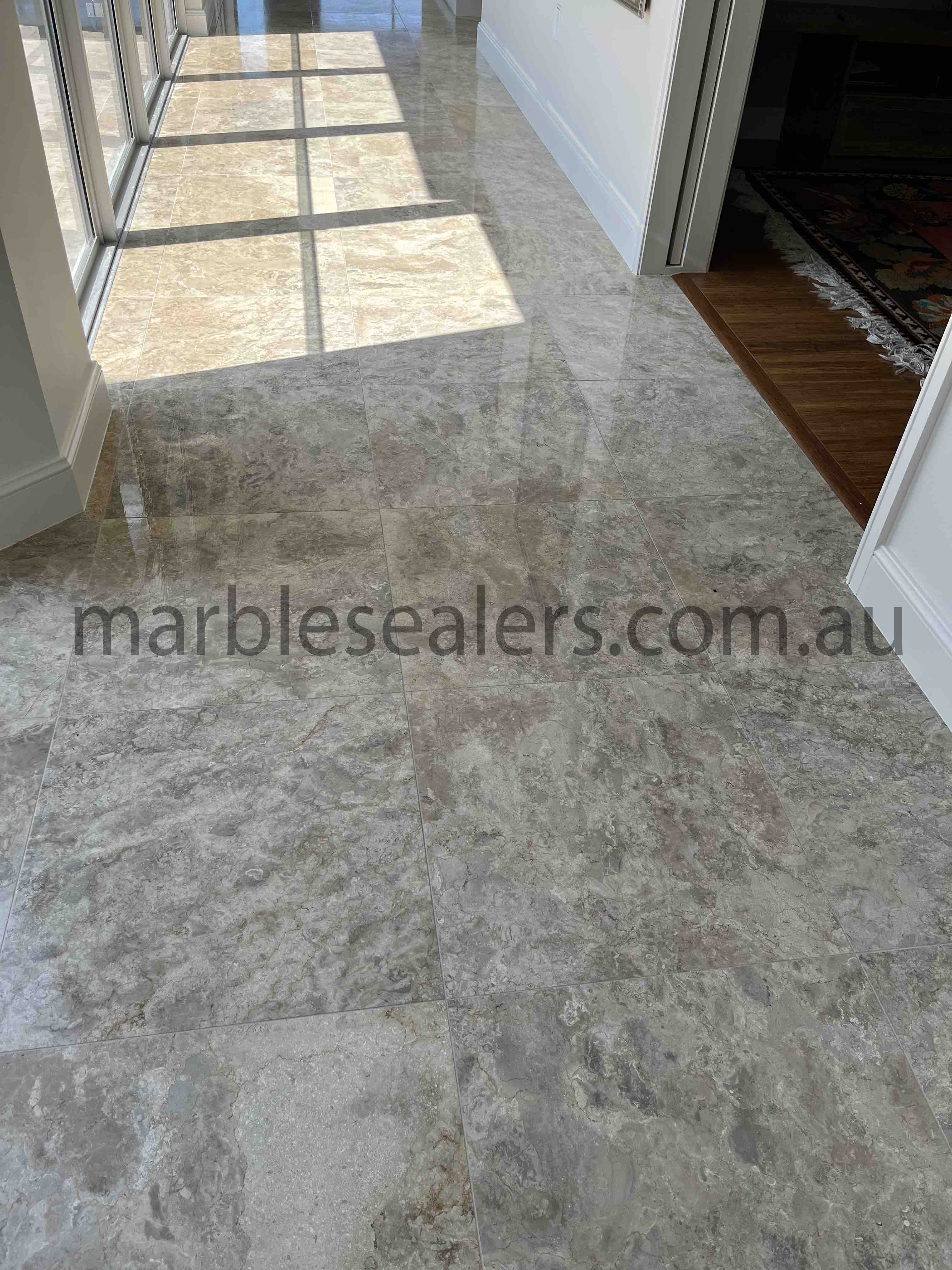
Fluoro-chemical technology integrated into GOLD represents the pinnacle of advancement in marble protection, offering unparalleled long-term defense against water and oil-based stains. The micro-molecular formula undergoes a chemical reaction with the marble surface, forming a bond that surpasses that of any conventional sealer, ensuring superior protection and durability.
Makes caring for your marble much easier!
Provides durable protection against stains, superior oil and water repellency, with no alteration to the natural surface appearance of your marble. This non-film forming sealer is breathable, making it easy to maintain while preserving the intrinsic beauty of your marble surfaces.
Some Good Advice
Select a reputable company with specialized equipment and expertise to accurately seal and maintain your marble once it's installed.
It's essential to maintain the cleanliness of your sealed marble, promptly wiping up spills and performing periodic cleaning to ensure its longevity and pristine appearance.
Professional cleaning is crucial not only for removing surface dirt but also for extracting dirt deeply embedded within the pores of marble.
Reach out to a professional stone floor maintenance company equipped with the necessary expertise and specialized equipment to ensure your valuable marble surfaces maintain their desired appearance.
Tile Cleaners Australia and StoneMaster are esteemed members of the network of independent Accredited Applicators, proficient in the correct application of marble care products. They provide a comprehensive service, including thorough cleaning of the marble area to be treated, expert product application, and diligent after-sales care to ensure the optimal maintenance of your marble surfaces.
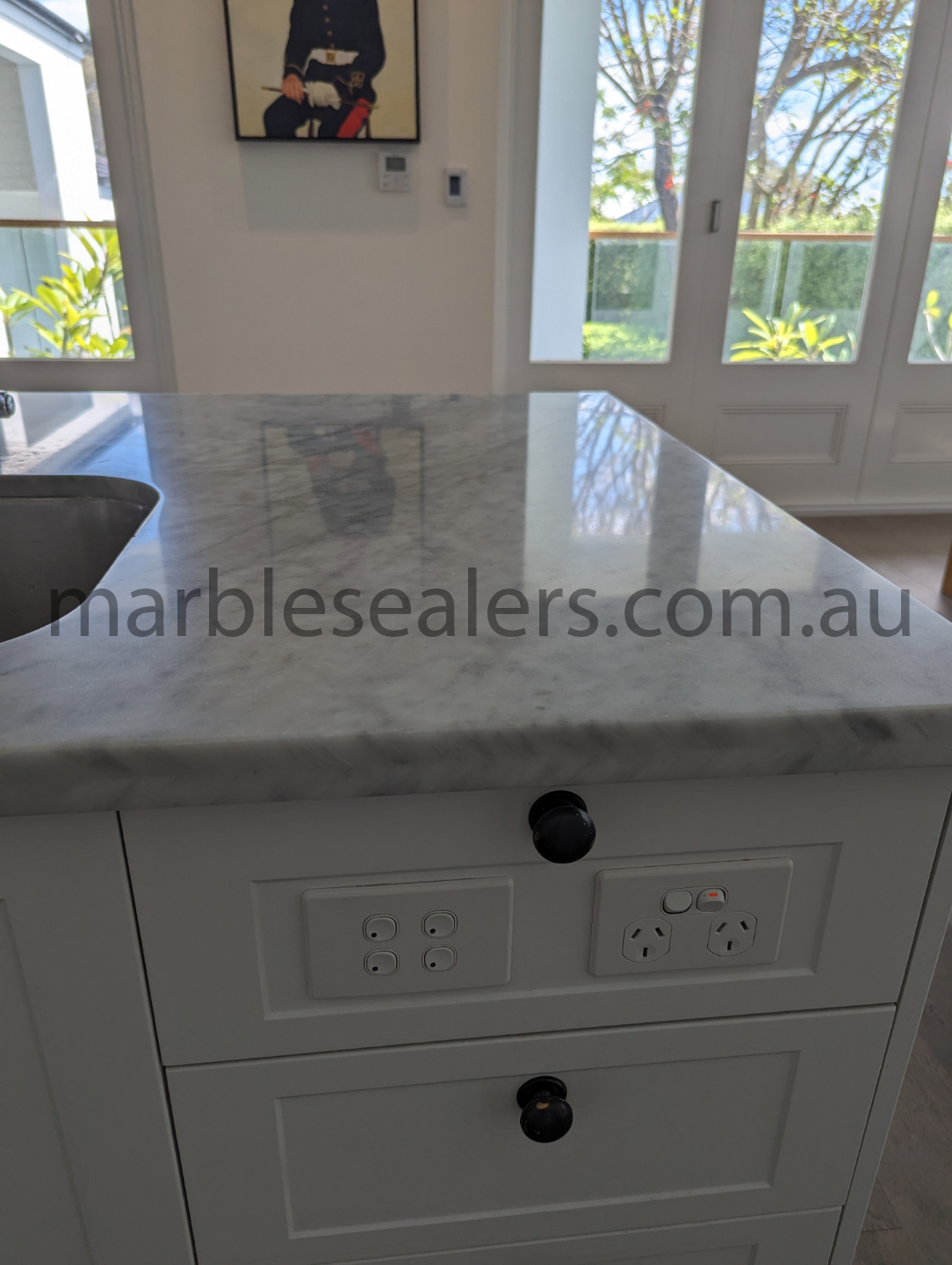
- Tile Cleaners Australia is Australia's leading expert in marble care, providing a full suite of specialized services including cleaning, sealing, stripping, regrouting, colour sealing, and minor repairs.
- Meanwhile, StoneMaster employs a diagnostic approach to tailor restoration methods to each unique marble situation, ensuring exceptional results and ongoing maintenance procedures for lasting elegance.
Ensuring your marble is thoroughly cleaned before sealing is crucial, as it can prevent sealing in old stains or dust and debris embedded in the stone. This ensures that the sealer effectively protects the marble, minimizing the need for future stripping and resealing.
Choosing a sealer that is unsuitable or of insufficient quality can lead to marble surfaces that fail to meet your expectations.

